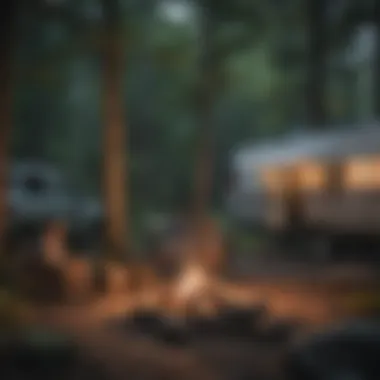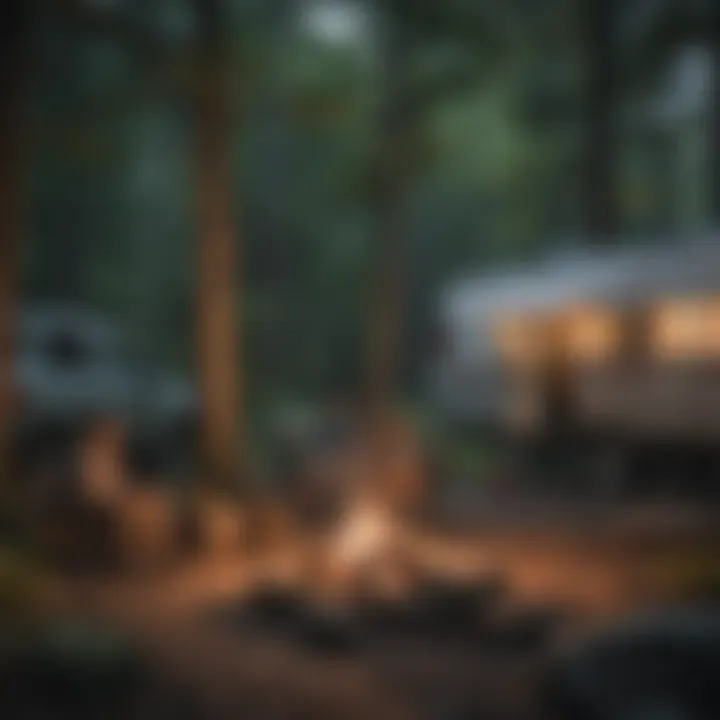Discovering Boston's Best Campgrounds: A Complete Guide


Intro
Boston, a city renowned for its historical significance and urban charm, also offers a unique opportunity for outdoor enthusiasts. Exploring campgrounds around Boston reveals a world where nature and city life coexist. Camping in this area provides not just a break from the urban hustle but also a chance for people to connect with the natural world. This guide delves into various campgrounds, analyzing their amenities, accessibility, and activities available.
Whether you are a seasoned camper or new to this experience, knowing the right spots to visit can enhance your outdoor adventure significantly. With a focus on conservation, the narrative will point out ways to enjoy nature responsibly while preserving local wildlife. From the beauty of lush landscapes to the thrill of outdoor activities, the campgrounds near Boston offer a compelling mix of excitement and tranquility.
Animal Profile
General Overview
Boston’s campgrounds provide habitats for a variety of wildlife. Common animals seen in these areas include deer, raccoons, and various bird species. The presence of these animals enriches the camping experience, presenting opportunities for wildlife observation and education. Engaging with the local fauna can deepen one’s appreciation for the environment and the delicate balance that sustains it.
Habitat and Distribution
The campgrounds are situated near woodlands, rivers, and coastal areas, which support diverse ecosystems. These habitats allow for species adaptation and survival. Understanding how these animals navigate their environments encourages campers to be respectful and mindful of their presence.
Fascinating Facts
Unique Traits and Adaptations
Wildlife in the Boston area has adapted to both urban and natural settings. For example, raccoons have benefited from living both in forested areas and near human habitats, showcasing their cleverness in finding food sources. This adaptability makes them a common sight at campgrounds.
Historical and Cultural Significance
Many species present in Boston's campgrounds have historical ties. Some animals have played roles in Native American folklore, highlighting their importance in cultural narratives. Recognizing these connections enhances our understanding of the land's history and fosters respect for its original inhabitants and their relationship with nature.
Conservation Status
Current Population Trends
Understanding population trends is crucial for conservation efforts. In many areas, local wildlife populations have faced pressures due to urbanization and habitat loss. Campsites often serve as sanctuaries for various species, helping maintain healthier populations.
Threats and Challenges
Threats to local wildlife include pollution and increasing human encroachment. Awareness of these challenges is critical for campers. By practicing sustainable camping methods, individuals can help mitigate negative impacts on the environment and wildlife.
Care Tips for Pet Owners
Basic Needs and Requirements
Camping often includes pets, and they need particular attention while in natural settings. It is important to ensure they have sufficient food, water, and safe spaces to roam in the camping areas. Keeping pets leashed can also help protect local wildlife.
Health and Wellness Tips
Pet owners should be aware of the seasonal conditions in Boston. Hot weather can lead to overheating, while cold temperatures may require extra precautions. Being prepared with the right gear for pets can significantly improve their comfort and health while camping.
Prelude to Camping in Boston
Camping is an activity that combines leisure, nature, and adventure. In the context of Boston, it holds significance for both residents and visitors. The idea of camping in a city environment might seem counterintuitive. However, Boston offers unique opportunities for urban camping. This guide aims to unpack the layers that make camping in the Boston area appealing, practical, and rewarding.
Historical Context of Camping
Camping as a recreational activity in the United States traces back to the late 19th century. The concept of escaping urban life gained traction during this period, allowing individuals to reconnect with nature. In Boston, a city rich in history, early camping movements were often tied to social changes and industrial growth.
Urban dwellers sought solace in nearby parks and rural areas. Over time, this led to the establishment of camps and facilities designed for recreational use. Today, Boston's campgrounds reflect this historical evolution, merging the past with a contemporary understanding of outdoor activities.
The Appeal of Urban Camping
Urban camping presents a unique blend of convenience and immersion in nature. For those who live or visit Boston, the proximity to natural settings encourages spontaneous outdoor experiences.
Some specific benefits include:
- Accessibility: Many campgrounds are just a short drive or public transport ride from the city, making them easily reachable.
- Convenience: Campers can enjoy outdoor activities without the need for extensive planning.
- Community: Urban campsites foster a sense of community, where individuals can share experiences and form connections.
Camping in a city environment also permits individuals to engage in nature in ways that may not be possible in more remote locations. Campers can enjoy both the tranquility of the outdoors and the vibrant culture of Boston.
Urban camping thus provides an enriching experience that accommodates both leisure and immediate access to city amenities.
Overview of Campgrounds in the Boston Area
Camping in the Boston area offers diverse experiences that range from rustic to more refined spots. Understanding the different options available can enhance trips for individuals and families alike. Urban camping is a unique opportunity that lets one escape the hustle while still being close to city amenities. This overview will explore three significant categories of campgrounds: public campgrounds, private campgrounds, and state parks. Each type provides distinct advantages, catering to varied preferences and needs of campers.
Types of Campgrounds
Public Campgrounds
Public campgrounds are often managed by government entities, providing accessible options for camping enthusiasts. These sites typically offer basic facilities, such as restrooms and picnic tables. The key characteristic of public campgrounds is affordability. Most public campgrounds charge lower fees compared to private ones, making them an attractive choice for budget-conscious campers.


A unique feature of public campgrounds is their ability to accommodate larger groups, which is beneficial for families and friends wanting to share experiences. However, this can also be a disadvantage, as crowded scenes might detract from the serene environment many seek when camping.
Private Campgrounds
Private campgrounds are often owned and operated by individuals or companies. They usually offer a higher level of amenities and services compared to public options. The key characteristic of private campgrounds is the range of facilities, which might include hookups for RVs, swimming pools, and organized activities. These campgrounds appeal to those looking for more comfort and convenience during their stay.
One unique feature of private campgrounds is the option for full-service camping. Guests might find cabins or lodges available for rent, providing an alternative to traditional tent camping. The disadvantage here is the higher cost, which might not suit everyone’s budget.
State Parks
State parks provide a balance between nature and accessibility. Many state parks have designated camping areas that are well-maintained and often integrated into larger natural reserves. The key characteristic of state parks is their emphasis on preserving local ecosystems while still offering recreational amenities.
A unique feature of state parks is the range of outdoor activities available. Campers can enjoy hiking, fishing, and wildlife watching. This makes state parks an excellent choice for individuals seeking a more immersive nature experience. However, reservations are often needed, particularly during peak seasons, which can be a hurdle for spontaneous trips.
Top Campgrounds in Boston
Boston Harbor Islands National Park
The Boston Harbor Islands National Park offers a unique urban camping opportunity. This location allows visitors to experience both the sea and city life simultaneously. The accessibility to various islands by ferry adds an adventurous element to the trip. One key characteristic of this park is its stunning views and rich history.
A unique feature is the diverse ecosystems found throughout the islands. Campers can explore beaches, forests, and wildlife habitats, making it a one-stop destination for nature lovers. However, the limitations in facilities could pose challenges for some visitors, as amenities may be more basic than those found in private campgrounds.
Gate of the Arctic National Park
Though not located in Boston, Gate of the Arctic National Park represents an important comparison for campers considering extreme wilderness experiences. This park is known for its remoteness and pristine landscapes. A key characteristic of the park is the lack of formal campgrounds, which offers a true backcountry experience for campers.
One unique feature of the park is its untouched wilderness. Campers must be self-sufficient, allowing for deeper immersion in nature. However, this may not be suitable for all campers, as it requires skill and preparation to navigate the rugged terrain.
Martha's Vineyard Campground
Martha's Vineyard Campground provides a beautiful setting by the coast. This campground is ideal for those wanting to combine relaxation with beach activities. The key characteristic is the scenic environment and friendly community. Campers can enjoy swimming, cycling, and exploring quaint towns nearby.
A unique feature of Martha’s Vineyard is its cultural vibrancy. Local events and festivals often enhance the camping experience with communal activities. However, during peak summer months, the site can become crowded, making early reservations crucial for securing a spot.
Amenities and Facilities
Exploring campgrounds in Boston involves understanding the variety of amenities and facilities available to enhance the camping experience. These offerings play a significant role in attracting campers, ensuring comfort, and meeting basic needs. A well-equipped campground can make a stay enjoyable and memorable.
Common Amenities
Restrooms
Restrooms are a fundamental aspect of campgrounds. They provide campers with necessary hygiene facilities. In Boston, having access to clean and functional restrooms is often seen as a priority for visitors.
A key characteristic of restrooms in campgrounds is accessibility. Campgrounds that are able to provide accessible restrooms ensure that everyone, including those with mobility challenges, can enjoy their stay comfortably.
Furthermore, restrooms can include showers, which add another layer of convenience for campers after outdoor activities. This is especially valued by families and long-term campers.
Camping Equipment Rentals
Camping equipment rentals offer campers a flexible option for enjoying their outdoor experience. For those who may not own specialized gear, these services are essential. Many campgrounds in Boston provide rentals, making it easy for visitors to access tents, cooking gear, and other necessities.
The convenience of having equipment available on-site cannot be overstated. It enables spontaneous trips and encourages more people to engage in camping who may otherwise not do so. However, it's important to consider pricing, availability, and the condition of the equipment when relying on these services.
Water Supply
Water supply stands as another critical component for campgrounds. Reliable access to potable water is essential for campers' health and safety. Boston's campgrounds generally ensure that fresh water is readily available for drinking, cooking, and cleaning.
The presence of water spigots or stations throughout the campground allows for ease of use. Furthermore, some campgrounds may offer additional features such as filtered water stations, ensuring high-quality drinking water.
Additional Services
Wi-Fi Accessibility
Wi-Fi accessibility has become a popular offering at many campgrounds. While camping typically signifies a break from technology, many visitors appreciate the option to connect with the internet. It enables campers to engage with online resources, plan local trips, or even work remotely if needed.
A key aspect of Wi-Fi accessibility is that it allows guests to share their experiences in real-time, enhancing social media engagement. However, it is vital to note that the quality of connection can vary, especially in more remote areas.
Local Attractions
Local attractions significantly enhance the camping experience in Boston. Campgrounds often serve as gateways to various historical sites, parks, and cultural hubs. Visitors can easily explore nearby attractions, enriching their overall trip.
Having nearby attractions adds another layer of convenience. Campers may choose to spend their days exploring and return to their comfortable bases at the campground at night. However, depending on the attraction, some may find increased foot traffic.
Pet-Friendly Options
Pet-friendly options represent an important amenity for many campers, allowing families to bring their pets along. Campgrounds that offer these options cater to a growing demographic of outdoor enthusiasts who consider pets part of their family.
The key feature of pet-friendly campgrounds is the assurance that pets will have designated areas and facilities for their needs. However, campers should also be mindful of leash laws and cleanliness to ensure a positive experience for all guests.


Campers increasingly seek locations that support their lifestyle, and having diverse amenities contributes to overall satisfaction.
In summary, amenities and facilities at Boston's campgrounds play a vital role in influencing the camping experience. The presence of restrooms, equipment rentals, water supplies, Wi-Fi, local attractions, and pet-friendly options enhances convenience, comfort, and enjoyment. It is these details that help shape the quality of camping in the urban environment.
Activities for Campers
Engaging in various activities is integral to the camping experience in Boston. These activities not only enhance the enjoyment of nature but also provide a sense of community among campers. Whether you are interested in exploring the trails or participating in local events, Boston's campgrounds offer a myriad of opportunities.
Recreational Opportunities
Hiking Trails
Hiking trails in and around Boston are valuable for both fitness and exploration. They connect campers with the region's natural beauty and provide an opportunity to exercise. The key characteristic of these trails is their accessibility. Many trails are situated near campgrounds, making them convenient for campers. A unique feature of Boston's hiking trails is variety; they range from easy paths suitable for families to more challenging routes for experienced hikers. The benefits of hiking in these locations include not only physical health but also mental well-being.
Fishing Spots
Fishing spots contribute significantly to Boston's camping experience. Many campgrounds are located near rivers, lakes, or coastal areas that offer excellent fishing opportunities. The appeal of fishing lies in its dual nature: it can be both relaxing and exciting. This makes it a popular choice among campers. Unique features, such as access to freshwater species or saltwater fishing, enhance the experience, allowing for diverse angling activities. However, it is important to check local regulations regarding fishing licenses and quotas.
Wildlife Watching
Wildlife watching is another engaging activity for campers in the Boston area. This activity encourages a deeper connection with nature and offers educational value. The key appeal of wildlife watching is the chance to observe various species in their natural habitats. Boston's ecosystem supports an array of wildlife, including birds, mammals, and marine life. A notable aspect of wildlife watching is the potential for unique sightings, which can vary significantly based on the season. However, maintaining a respectful distance from wildlife is crucial to ensure their safety and well-being.
Community Events
Community events enrich the camping experience further, providing opportunities for social interaction and learning.
Workshops
Workshops offered in local campgrounds often focus on outdoor skills or conservation topics. These educational sessions allow campers to connect with experts and enhance their knowledge. The key feature of these workshops is hands-on learning, which can provide practical skills applicable during camping. Unique benefits include the chance to make new friends and learn about local wildlife. However, sometimes workshops may come with a fee, making it essential to plan ahead.
Guided Tours
Guided tours are a beneficial choice for campers wanting to explore Boston’s natural landscapes with expert insight. They provide structured experiences that ensure safety and maximize enjoyment. The key characteristic of guided tours is their informative nature, often focusing on local ecology or history. Unique features include themed tours, such as birdwatching or historical explorations of the area. However, the disadvantage might be the need for advance booking, which can limit last-minute campers.
Local Festivals
Local festivals create a vibrant atmosphere throughout the camping season. These events typically include food, music, and cultural displays, offering campers a chance to experience the local community. The key delight of local festivals is their celebration of Boston’s culture and traditions. Unique aspects could include craft markets or live performances, fostering a lively environment. Despite their appeal, festivals can draw larger crowds, which may detract from a quiet camping experience.
Engaging in activities of all types makes camping a rich experience. From hiking and fishing to participating in community events, there’s something for everyone.
By partaking in these activities, campers can create lasting memories while gaining a greater appreciation for the natural and community resources available in and around Boston.
Tips for Camping in Boston
Camping in Boston can be a delightful experience, provided you take the necessary steps to prepare adequately. This section will cover key elements, from trip planning to safety precautions, that will enhance your camping venture. Emphasizing these tips simplifies the process and can make the experience enjoyable while minimizing potential risks.
Planning Your Trip
Best Seasons for Camping
The best seasons for camping in Boston typically occur during the late spring and early fall. During these times, weather conditions are mild, providing a comfortable outdoor experience. The temperature during these seasons is generally pleasant, enabling campers to engage in various outdoor activities.
Many seasoned campers recommend summer as well, though it can bring humidity and potential storms. Alternatively, fall offers breathtaking foliage, enriching your surroundings with vibrant colors.
Mid-spring is also an option, yet one should be aware of the lingering chill and occasional rain. Choosing the right season enhances your overall experience significantly. Consequently, understanding the unique seasonal characteristics can help guide your choice effectively.
Permits and Reservations
Obtaining permits and making reservations is crucial for a smooth camping experience in Boston. Many campgrounds require a reservation, especially during peak seasons. This ensures that you have a secured spot, allowing for better planning.
The specific procdures differ among various campgrounds. Some might necessitate permits for specific activities, such as fishing or hiking. Being proactive about these aspects eliminates any last-minute surprises at the campsite. Failing to secure the required permits can lead to disappointment and frustration. Understanding this requirement contributes significantly to enjoying your time outdoors.
Safety Considerations
Wildlife Safety
Wildlife safety is a vital aspect of camping. Boston's campgrounds may be home to several animal species, some of which could pose risks. Learning how to identify and avoid potential dangers is essential when camping in the area.
Additionally, understanding animal behavior helps you manage encounters efficiently. For example, storing food properly can deter curious raccoons or squirrels from your campsite. This aspect protects both your belongings and the local wildlife, contributing to a harmonious camping experience.
Being informed about local wildlife enhances your knowledge of nature while ensuring a respectful coexistence with animals.
First Aid Essentials
Having first aid essentials on hand is an important component of camp readiness. You should pack a basic first aid kit containing items such as band-aids, antiseptic wipes, and gauze. These items equip you to handle minor injuries promptly.
It is also prudent to learn how to treat common camp injuries, like cuts and scrapes. Additionally, understanding the signs of allergic reactions or heat-related issues is crucial, as these can occur with outdoor activities. Constant access to first aid supplies empowers you to respond efficiently during emergencies, creating a safer environment for everyone.


Always prioritize safety and be prepared for unforeseen situation when camping!
By considering these tips, you can maximize the benefits of your camping experience in Boston while ensuring that you are prepared for any challenges that may arise.
Challenges Faced by Campers
Camping in an urban area like Boston presents unique challenges. These challenges not only affect the overall camping experience but also influence how individuals connect with nature amidst the urban environment. Understanding these difficulties can help campers prepare better and appreciate the recreational activities available to them. In this section, we examine the limitations of urban camping and environmental concerns that arise.
Urban Camping Limitations
Noise Pollution
Noise pollution is a significant factor that impacts the enjoyment of camping in Boston. The constant hum of traffic, sirens, and street activities can detract from the peace and quiet commonly associated with camping. Campers often find it challenging to create a serene atmosphere amidst the city's hustle and bustle.
- Urban settings often provide less isolation than rural campgrounds.
- It can disrupt wildlife presence, making sightings less frequent.
- For many, noise is a significant drawback when trying to relax or enjoy nature.
While some may find the energy of the city stimulating, it can be cumbersome for those seeking a retreat. The combination of sounds can make it difficult to engage in activities like meditation or leisurely reading by the campfire. Noise, while sometimes overlooked, is a crucial factor influencing the camping experience in Boston.
Space Constraints
Space constraints are another limitation that urban campers may face. Campgrounds in the Boston area often have limited areas for pitching tents or setting up recreational vehicles. This can lead to overcrowding, especially during peak seasons.
- Many campgrounds are small and may not accommodate large groups comfortably.
- The proximity of sites to one another can affect privacy and the overall sense of isolation that many seek.
- Reservations are essential, as sites can quickly fill up.
The constraints of space can impose restrictions on the camping layout and limit recreational activities. Campsites may feel cramped, and the lack of personal space can be off-putting for some. Therefore, understanding the implications of space constraints adds depth to how one can plan a successful camping trip in Boston.
Environmental Concerns
Environmental concerns are paramount in any camping scenario, especially in urban settings. As nature clashes with city life, the impact on local ecosystems becomes apparent. Campbell often need to be aware of their hiking routes, camping areas, and waste management practices.
Waste Management
Proper waste management is critical for preserving the environment. It ensures clean and livable spaces for other campers and protects local wildlife from pollution. In Boston, where nature interacts closely with urban infrastructure, this is a pressing concern.
- Many campgrounds provide limited garbage disposal options, making it essential for campers to have their waste management plans.
- Educating campers about Leave No Trace principles can significantly help reduce waste.
- Effective waste management prevents local pollution and promotes sustainability.
A focus on this topic raises awareness about the importance of responsible camping practices, essential for long-term conservation efforts. Greater awareness of waste management enhances the camping experience while contributing positively to the surrounding areas.
Erosion and Habitat Preservation
Erosion and habitat preservation are vital components of environmental concerns. Camping in sensitive areas can lead to soil erosion, damaging existing ecosystems. Protecting these habitats is essential for maintaining biodiversity and the aesthetic quality of the camping environment.
- Campers should stay on designated trails to minimize environmental impact.
- It's crucial to understand the local flora and fauna to avoid disturbing ecosystems.
- Engaging in preservation efforts, like planting trees or removing debris, enhances community involvement.
Increasing awareness of these factors can cultivate a sense of responsibility among campers. Thus, addressing these environmental concerns plays a significant role in enriching the camping experience while preserving what makes the natural spaces in and around Boston unique.
Conservation and Local Wildlife
Conservation and local wildlife are critical themes when discussing campgrounds in Boston. These elements are not only fundamental for sustaining natural resources, but they also enrich the camping experience. By preserving local flora and fauna, campers can engage with nature in a more meaningful way. Awareness about conservation efforts encourages responsible interaction with the environment. It also highlights the role of individuals in making small changes that contribute to larger ecological benefits.
Importance of Preservation
The importance of preservation goes beyond maintaining the beauty of Boston's natural landscapes. It involves safeguarding habitats that support diverse species. Healthy ecosystems ensure that local wildlife thrives, creating opportunities for wildlife watching and educational experiences for campers. Preservation also helps mitigate the impacts of urban development which poses threats to both plant and animal species. For this reason, understanding the importance of preservation is crucial for every camper.
Engaging in Conservation Efforts
Local Organizations
Local organizations play a huge role in conservation efforts. These groups focus on habitat restoration, awareness campaigns, and educational programs. One well-known organization is the Massachusetts Audubon Society. This organization stands out due to its commitment to education and conservation. It offers programs that engage the public in local wildlife preservation topics, providing resources for outdoor enthusiasts to learn more about the ecosystem. Such organizations not only play an essential part in conservation but also serve as a bridge connecting campers with opportunities to contribute positively to the environment.
Volunteer Opportunities
Volunteer opportunities are widely available for those interested in engaging further in conservation efforts. Many organizations offer chances to participate in clean-up events, wildlife monitoring, and community workshops. Engaging in volunteer work allows campers to meet like-minded people who care about the environment. Additionally, these efforts greatly contribute to the overall goal of maintaining Boston’s natural spaces. However, volunteers need to be aware of the commitment involved, as some programs require time and dedicated effort. In summary, volunteer work represents a rewarding way to give back and take an active role in conservation.
Engaging with local organizations and volunteering provides not just a chance to contribute, but also a deeper understanding of conservation's importance in the urban ecosystem.
End
In summary, the exploration of campgrounds in Boston reveals both unique opportunities and important considerations for outdoor enthusiasts. Camping in this bustling urban region offers distinct benefits, whether it be a brief escape from daily routines or a deeper connection with nature.
Recap of Camping Benefits in Boston
Camping in Boston provides a multifaceted experience surrounded by historical sites and natural beauty. The following points highlight the core benefits:
- Accessibility: Many campgrounds are just a short drive or public transport ride away, making them convenient for residents and visitors alike.
- Diverse Environments: Whether one prefers coastal views, wooded areas, or picturesque parks, the local campgrounds cater to various preferences.
- Community Engagement: Campers often partake in community events, strengthening bonds with fellow nature lovers and enhancing the overall experience.
- Wildlife Connection: Observing local wildlife in their natural habitat can foster a greater appreciation for environmental conservation efforts.
- Cultural Richness: Camping near historical sites can provide educational opportunities, enriching the camping experience.
In essence, camping in Boston nurtures a balance between urban life and nature, encouraging individuals to embrace the outdoors.
Final Thoughts
As seen throughout this article, the camping experience in Boston is valuable for many reasons. It allows individuals to disconnect from the chaos of city life and reconnect with the natural environment. The various campgrounds available provide flexible options, catering to different preferences and needs.
Campers must remember the significance of preserving nature. Engaging in responsible camping practices ensures that the beauty around Boston remains for future generations. Local organizations play a critical role in conservation efforts, and supporting them can amplify the impact we have on the environment.















